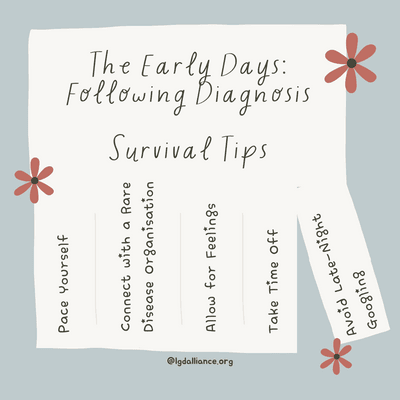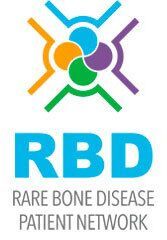
Receiving news of a rare disease diagnosis like Compex Lymphatic Anomalies (CLA) can be an emotionally charged experience. You may find out after a long period of seeking answers about your own, a partner’s, or your child’s health, or it might come unexpectedly. In some cases, a diagnosis can arrive 'out of the blue' following treatment or investigations for another health issue, leaving you in shock. Here, we explore some survival tips to help you navigate the early days following a CLA diagnosis.
How emotionally prepared you are for the diagnosis will greatly influence your initial response and feelings. The news might be delivered in various ways: during an appointment with a healthcare professional, via a letter or phone call. Many people vividly remember the circumstances surrounding their diagnosis, including small details like the room, the weather, or what they or the person delivering the news were wearing.
Ideally, you will have the opportunity to ask questions, receive clear and supportive information about the next steps, and be connected with a rare condition organization such as LGDA.
Lots of Appointments or ‘Watch & Wait’?
The early weeks and months after a CLA diagnosis can vary greatly depending on your condition. It might be a whirlwind of tests, scans, and appointments as doctors gather more information about your health. This intensity likely won't last forever. For other conditions, the early days might be slower-paced, with advice to 'watch and wait', monitoring for any new symptoms.
Reimagining the Future
Everyone processes the news of a diagnosis in their own way and time. Your feelings about it might change over time, and not everyone in your family will respond the same way. There is no right or wrong way to feel.
One significant aspect of coming to terms with a diagnosis is reimagining the future. This involves letting go of the future you had envisioned and accepting one that now includes the impact of a CLA. This process can bring about a range of emotions depending on the condition and its effects on you or your loved one.
Impact on Family Relationships
A diagnosis can either bring your family closer together or create tensions. Remember, each family member has their own coping mechanisms. One person might want to talk a lot about it, while another prefers to be more private. Communicate your preferences to your healthcare providers and loved ones. This may change over time, and that's okay too. Learn more about CLAs.
Survival Tips for the Early Days
- Learning About Your Condition: How much information you want to know about your condition is a personal choice. Some prefer to learn everything they can right away, while others take it one step at a time. Communicating your preference to your doctors can be helpful and might change over time. Learn more about CLAs.
- Pace Yourself: There is a lot to process in the early days of a diagnosis. Make time for the ordinary things you enjoy, whether alone or with loved ones. Activities like watching your favorite TV shows or engaging in meaningful hobbies remind you that your condition is part of your life, but not all of who you are. These activities can also be good distractions from worry or stress.
- Make Contact with a Rare Condition Organization: LGDA is a great sources of information, support, and advice. You can be as involved as you like, but knowing they are there can be very reassuring. Even if you don't engage actively, knowing they're there can be comforting. Join the LGDA Support Group.
- Allow for Feelings: Talking about your feelings helps process them. Speak with someone you trust, whether a friend, family member, or someone from a rare condition organization. Take time to do things you enjoy to give yourself time to process your emotions.
- Try Not to ‘Google’ Late at Night: Nightime can amplify worries. Try to do your research during the day using trusted sources or reputable rare disease organization. Remember, what you read might always reflect your specific situation.










